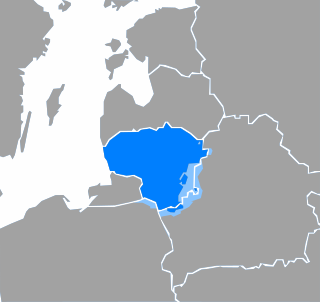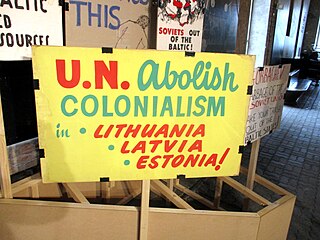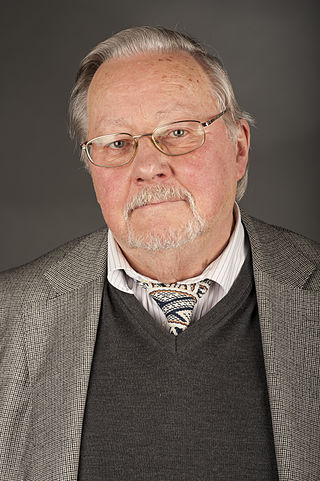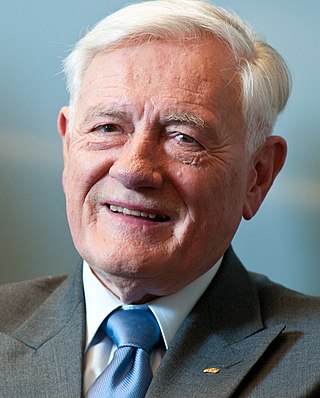
Stephen Báthory was Voivode of Transylvania (1571–1576), Prince of Transylvania (1576–1586), as well as King of Poland and Grand Duke of Lithuania (1576–1586).

Lithuanian is an East Baltic language belonging to the Baltic branch of the Indo-European language family. It is the language of Lithuanians and the official language of Lithuania as well as one of the official languages of the European Union. There are approximately 2.8 million native Lithuanian speakers in Lithuania and about 1 million speakers elsewhere. Around half a million inhabitants of Lithuania of non-Lithuanian background speak Lithuanian daily as a second language.

The Polish–Lithuanian Commonwealth, formally known as the Kingdom of Poland and the Grand Duchy of Lithuania and also referred to as Poland–Lithuania or the First Polish Republic, was a federative real union between the Kingdom of Poland and the Grand Duchy of Lithuania, existing from 1569 to 1795. This state was among the largest and most populated countries of 16th- to 17th-century Europe. At its peak in the early 17th century, the Commonwealth spanned nearly 1,000,000 km2 (390,000 sq mi) and supported a multi-ethnic population of approximately 12 million as of 1618. The official languages of the Commonwealth were Polish and Latin, with Catholicism as the state religion.

Romuva is a neo-pagan movement derived from the traditional mythology of the Lithuanians, attempting to reconstruct the religious rituals of the Lithuanians before their Christianization in 1387. Practitioners of Romuva claim to continue Baltic pagan traditions which survived in folklore, customs and superstition. Romuva is a polytheistic pagan faith which asserts the sanctity of nature and ancestor worship. Practicing the Romuva faith is seen by many adherents as a form of cultural pride, along with celebrating traditional forms of art, retelling Baltic folklore, practicing traditional holidays, playing traditional Baltic music, singing traditional dainos (songs), as well as ecological activism and stewarding sacred places.

The Grand Duchy of Lithuania was a sovereign state in northeastern Europe that existed from the 13th century, succeeding the Kingdom of Lithuania, to the late 18th century, when the territory was suppressed during the 1795 partitions of Poland–Lithuania. The state was founded by Lithuanians, who were at the time a polytheistic nation of several united Baltic tribes from Aukštaitija. By 1440 the grand duchy had become the largest European state, controlling an area from the Baltic Sea in the north to the Black Sea in the south.

The occupation of the Baltic states was a period of annexation of Estonia, Latvia and Lithuania by the Soviet Union from 1940 until its dissolution in 1991. For a brief period, Nazi Germany occupied the Baltic states after it invaded the Soviet Union in 1941.

Vytautas Landsbergis is a Lithuanian politician and former Member of the European Parliament. He was the first Speaker of Reconstituent Seimas of Lithuania after its independence declaration from the Soviet Union. He has written 20 books on a variety of topics, including a biography of Mikalojus Konstantinas Čiurlionis, as well as works on politics and music. He is a founding signatory of the Prague Declaration, and a member of the international advisory council of the Victims of Communism Memorial Foundation.

Valdas Adamkus is a Lithuanian politician, diplomat and civil engineer who served as the fifth and seventh president of Lithuania from 1998 to 2003 and again from 2004 to 2009.

The Lithuania national football team represents Lithuania in men's international football, and is controlled by the Lithuanian Football Federation, the governing body for football in Lithuania. They played their first match in 1923. In 1940, Lithuania was occupied by the Soviet Union; the country regained its independence in 1990 and played their first match thereafter against Georgia on 27 May of that year.
Kauno futbolo ir beisbolo klubas, commonly known as FBK Kaunas, was a Lithuanian football club from the city of Kaunas.

The June Uprising was a brief period of the history of Lithuania in late June 1941 between the first Soviet and the Nazi occupations.
Baltic neopaganism is a category of autochthonous religious movements which have revitalised within the Baltic people. These movements trace their origins back to the 19th century and they were suppressed under the Soviet Union; after its fall they have witnessed a blossoming alongside the national and cultural identity reawakening of the Baltic peoples, both in their homelands and among expatriate Baltic communities, with close ties to conservation movements. One of the first ideologues of the revival was the Prussian Lithuanian poet and philosopher Vydūnas.
Lithuania was represented at the Eurovision Song Contest 2005 with the song "Little by Little", composed by Bobby Ljunggren, with lyrics by William "Billy" Butt, and performed by Laura and the Lovers. The Lithuanian participating broadcaster, Lietuvos radijas ir televizija (LRT), organised the national final "Eurovizijos" dainų konkurso nacionalinė atranka in order to select its entry for the contest. The national final took place over eight weeks and involved 49 competing entries. The results of each show were determined entirely by a public vote. In the final, twenty entries remained and "Little by Little" performed by Laura and the Lovers was selected as the winner with 5,465 votes.

The Poles in Lithuania, also called Lithuanian Poles, estimated at 183,000 people in the 2021 Lithuanian census or 6.5% of Lithuania's total population, are the country's largest ethnic minority.

The Kingdom of Lithuania was an attempt to establish an independent constitutional Lithuanian monarchy in February 1918. It was created towards the end of World War I when Lithuanian-speaking lands were under military occupation by the German Empire. The state was officially dissolved in November 1918.
The Lithuanian A Lyga 2005 was the 16th season of top-tier football in Lithuania. The season started on 12 April 2005 and ended on 12 November 2005. 10 teams participated with Ekranas winning the championship.

Culture of Lithuania combines an indigenous heritage, represented by the unique Lithuanian language, with Nordic cultural aspects and Catholic traditions resulting from historical ties with Poland. Although linguistic resemblances represent strong cultural ties with Latvia in various historical moments Lithuania was influenced by Nordic, Germanic and Slavic cultures. Various cultural changes occurred throughout Lithuania's transformation from a country occupied by the Soviet Union to an independent Baltic state. The culture of Lithuania can be divided into five ethnographic regions: Dzūkija, Žemaitija, Aukštaitija, Suvalkija and Mažoji Lietuva.

The military occupation of Lithuania by Nazi Germany lasted from the German invasion of the Soviet Union on June 22, 1941, to the end of the Battle of Memel on January 28, 1945. At first the Germans were welcomed as liberators from the repressive Soviet regime which had occupied Lithuania. In hopes of re-establishing independence or regaining some autonomy, Lithuanians organized a Provisional Government that lasted six weeks.

RKL(Lithuanian: Regionų krepšino lyga, English: Regional Basketball League) is a third Lithuania basketball league. Regional Basketball League started their activity in 2005. RKL consists of 32 basketball teams from 28 Lithuania cities. Regions divided to four groups: Aukštaitija, Žemaitija, Suvalkija and center of Lithuania. Each group has eight basketball teams. In the 2006-2007 RKL season, there was some differences as the regions was divided to two groups: East and West of Lithuania and the number of participants was 28. There is B Division of RKL, which is the 4th tier basketball league of Lithuania.

The Lithuanian Auxiliary Police was a Schutzmannschaft formation formed during the German occupation of Lithuania between 1941 and 1944, with the first battalions originating from the most reliable freedom fighters, disbanded following the 1941 anti-Soviet Lithuanian June Uprising in 1941. Lithuanian activists hoped that these units would be the basis of a reestablished Lithuanian Army commanded by the Lithuanian Provisional Government. Instead, they were put under the orders of the SS- und Polizeiführer in Lithuania.
















